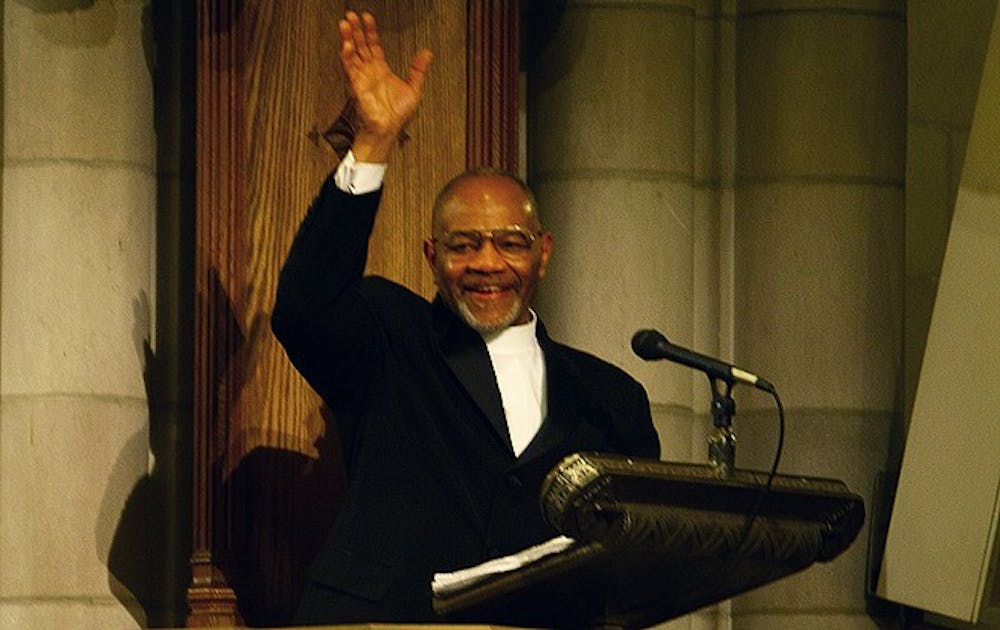The University’s annual Martin Luther King Day service was particularly poignant this year, 50 years after the first group of black undergraduate students matriculated to Duke.
Rev. William Turner, professor of the practice of homiletics at the Divinity School, delivered the keynote address to a crowd that included local residents, students and University officials. Turner, a 1971 Duke graduate, was among the first black students at the University. Turner described how the University evolved from hostile, unwelcoming environment for black students to a more inclusive one today.
“I did not come here to praise Duke in a manner that is uncritical,” Turner said. “No. There are scars [with me].... Is it ok to tell the truth?”
Turner reflected on his experience to tell the story of his generation, the generation he described as “precocious, and brash enough not to be daunted” by the “Gothic Rockpile”—that university that appeared so inaccessible for black students. He told the stories of the battered and the broken, the encounters with other undergraduates late at night on campus that invariably ended in taunts like, "N****r, let me see you run."
But Turner noted that he was optimistic that the University could change its culture and abandon bigotry.
“This [University], it becomes home,” Turner said at the Chapel’s pulpit, “You fix what you can... to hopefully turn it into a better place.”
After growing up in Virginia during the height of the Civil Rights Movement, Turner graduated valedictorian from high school and matriculated in 1966 to Duke as part of just the fourth class of black undergraduates. Turner remained a pioneer on campus, walking on to the football team as the first black player. After earning a BSE, M. Div and Ph.D. from Duke, Turner remained a fixture of University life as assistant provost and dean of black affairs and director of African American studies, and in the Durham community as preacher and pastor for a different congregations.
Accompanied by gospel choirs, djembe, and colorful displays of African drums, Turner offered a social critique of Duke and Durham to those in the pews.
Noting that the undergraduate years are a time of change and formation for a student, Turner asked how Duke and the nation will emerge from its “juvenile status.”
Turner challenged the student body and the parts of Durham represented in the campus monument to be bold rather than to be timid when coming out of the ‘juvenile’ years.
“We have the power.... We can return to a painful past, back to a fictitious neverland, or move forward,” Turner noted to an enthusiastic crowd, “Proceed!”
As choruses of ‘Proceed!’ rang through the benches, the keynote address ended and Turner took his seat next to President Richard Brodhead, Dr. Victor Dzau, president and CEO of Duke University Health System, and Chapel Dean Luke Powery. All three gave speeches preceding Turner’s address that addressed the present impact of King’s philosophy.
Brodhead discussed the “power” inherent in black people who tried to lift themselves out of the racism and discrimination that persisted for entire lifetimes. Turner’s generation showed courage and fought prejudice through service to their community, Brodhead said.
"[They perceived that] what is, is not right. What is, is not what could be,” he noted.
Dzau discussed high obesity and uninsured rates in Durham, noting that King also knew that "Service is not finished." The goals of improved health outcomes, poverty, education and diminished homelessness will require more than legislation to solve, Dzau argued. It will take community service.
"Nothing is impossible with God," Powery added in his invocation.
Get The Chronicle straight to your inbox
Signup for our weekly newsletter. Cancel at any time.

